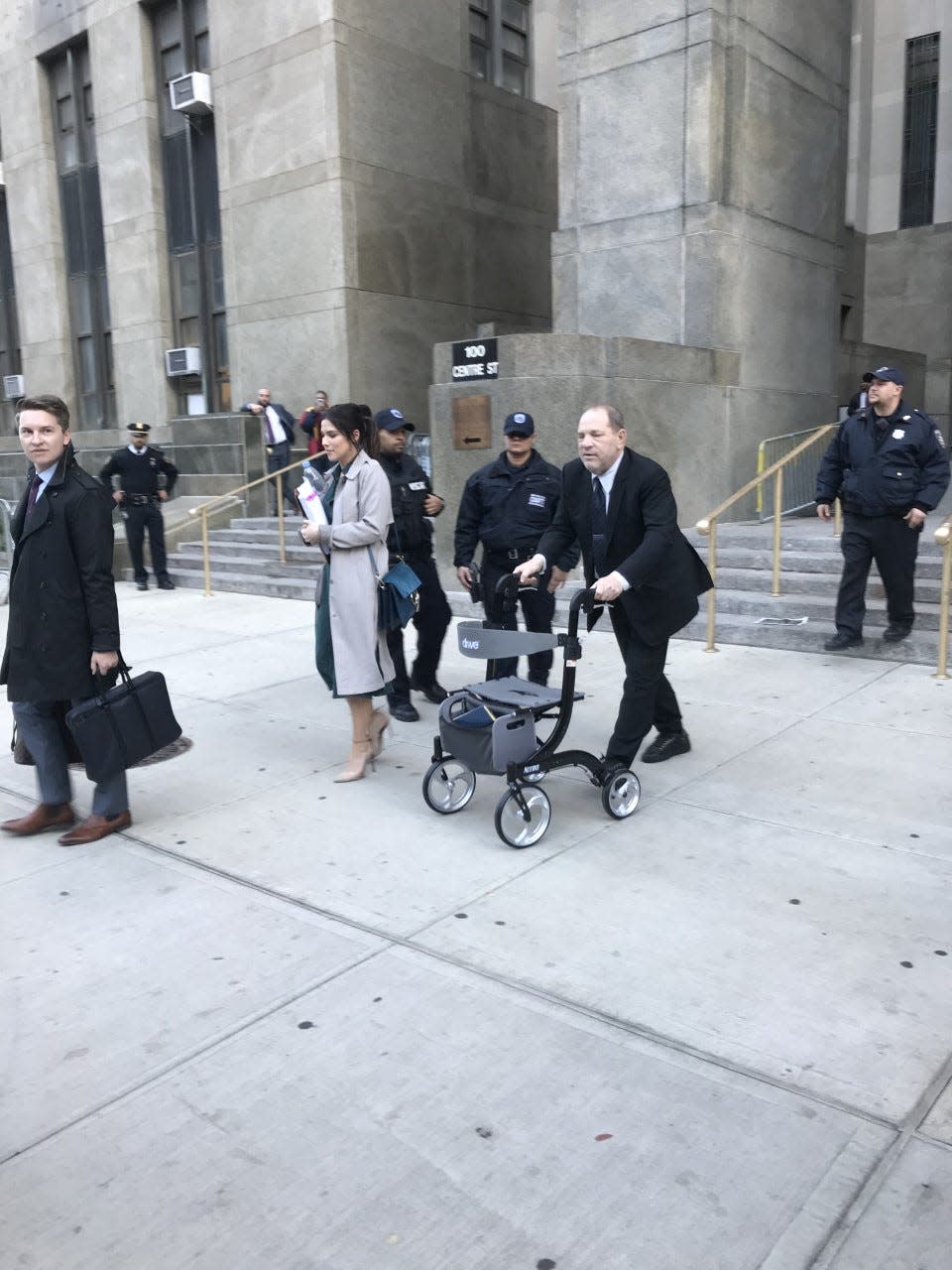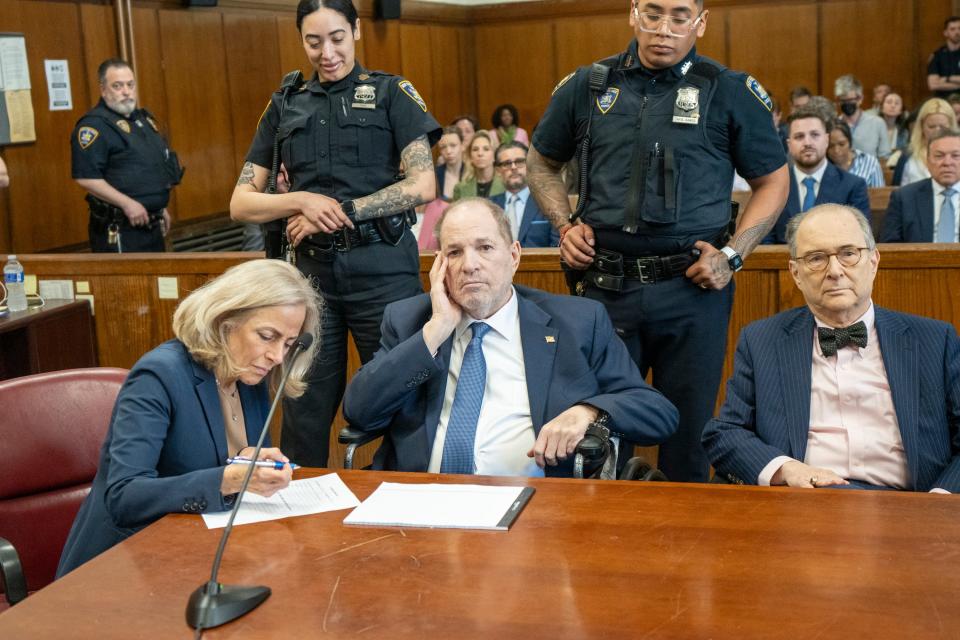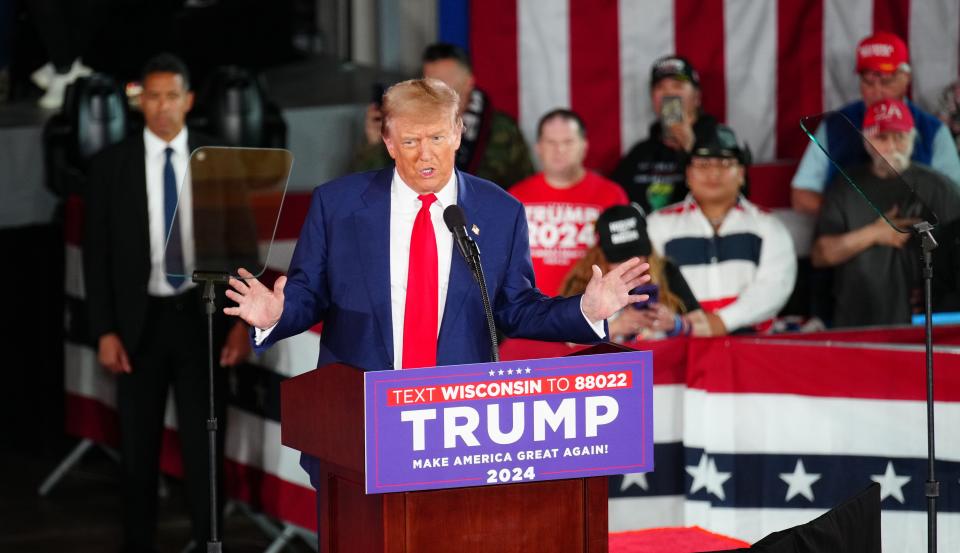Harvey Weinstein and Donald Trump: Could their cases entirely upend #MeToo? | Mike Kelly
- Oops!Something went wrong.Please try again later.
- Oops!Something went wrong.Please try again later.
Soon after Hollywood mogul Harvey Weinstein was convicted of rape and sexual assault four years ago, another kind of mogul had something to say.
“From the standpoint of women, I think it was a great thing,” said then-President Donald Trump, the onetime real estate and casino tycoon and now the mogul-like leader of MAGA nation.
Back then, the Weinstein conviction was seen as a high point for the #MeToo movement by women to hold powerful men accountable for their sexual misdeeds. Trump went on to call it a “great victory” that “sends a very strong message, a very, very strong message.”

Well, what’s the message now?
Weinstein’s dual conviction for engaging in a criminal sex act by forcibly performing oral sex in 2006 on a female TV and film producer and third-degree rape of an aspiring actress in 2013 was reversed last week by New York state’s Court of Appeals, which ordered a new trial in Manhattan. Meanwhile, Trump is again running for the White House — his third campaign for the presidency. But he’s also standing trial in that same Manhattan courtroom where Weinstein was convicted in 2020.
The charges against Trump are far different from those Weinstein faced — and faces again in a retrial. But the core of Trump’s case is framed by a set of facts that intersect with the same kind of #MeToo movement stories that first drew attention to alleged sexual predators like Weinstein.
Where do the Weinstein and Trump cases overlap?
Trump is accused of 34 counts of doctoring his financial records to hide hush money payments to an alleged mistress and porn star actress who allegedly threatened to go public with their relationship in 2016 and derail his first presidential campaign. The case is viewed by legal experts as a journey into Trump's loose and occasionally sleazy financial record-keeping. But the central storyline of the case is a tale of a woman who wanted Trump to approve her request for a chance to star in his NBC television show, “The Apprentice,” and was persuaded to succumb to his sexual advances. In other words, a woman needing a favor from a powerful man. It's a tale as old as the Bible.
The woman in question, Stephanie Clifford, who is known mostly now by her adult film star moniker of “Stormy Daniels,” never got the job on Trump’s TV show. But as she tells the story, Trump definitely got her into his bed.
Trump denies any relationship with Daniels. But the news of that alleged tryst — and Daniels’ threat to go public with her story in October 2016 — reportedly sent Trump’s political advisers into high-octane damage control.

The election then was only a few weeks away. Polls showed that Trump was steadily gaining on the Democratic candidate, Hillary Clinton — and had a real chance of winning.
But Trump was facing major image problems. A video and audio tape, recorded years earlier, had just surfaced, with Trump bragging that he could grab women’s genitals and sounding very much like a powerful mogul demanding sex from a younger woman. Indeed, when it came to having their way with vulnerable women, Trump’s words mirrored those of many influential men — like Weinstein.
“When you’re a star, they let you do it. You can do anything,” Trump is recorded telling TV's “Access Hollywood” host Billy Bush. “Grab them by the [expletive]. You can do anything.”

As prosecutors in Manhattan now convey the story, if Stormy Daniels came forward with her own tale about Trump in the waning days of the election campaign, Trump’s advisers believed it would undermine his chances to win the presidency.
So Trump’s lawyer, Michael Cohen, reportedly paid $130,000 for Daniels’ promise of silence — what prosecutors now describe as an election-related expense. Trump, in turn, reimbursed Cohen, but never declared on his records the true reason for the payment. And so, Trump is now on trial, accused by prosecutor Michael Colangelo in his opening statement of “election fraud, pure and simple” — a felony. If convicted, Trump could face a prison sentence.
Whether Colangelo’s statement turns out to be true is up to a jury to decide. Only a few witnesses have testified so far, and the trial is likely to last another month or more. But already an unsettling similarity to the legal strategies that upended Weinstein’s conviction is bubbling up in Trump’s trial.
Mike Kelly: Can Americans trust a verdict in Donald Trump's hush-money case? Will they?
New York’s appellate judges who reversed Weinstein’s conviction cited a decision by the trial judge to let prosecutors introduce evidence that Weinstein targeted other women who were not included in the charges against him. A different judge is presiding over the Trump case. But, to a lesser degree, he has allowed Trump's prosecutors to use the same technique of introducing the kind of evidence that upended the Weinstein case.
It’s worth pointing out here that a foundational pillar of the American judicial system is that a defendant might have led a tawdry life but should have to answer only to specific charges. In other words, prosecutors can’t necessarily tell a jury about a whole life of crime or even a history of questionable and creepy behavior; they can refer in court only to a specific crime that is cited in an indictment. Most prosecutors are blocked from telling a jury about previous misdeeds — even convictions.
So while Weinstein was charged with sexual misdeeds against only two women, prosecutors were allowed to introduce evidence of his allegedly long history of predatory sexual behavior against many women. In its 4-3 decision, the New York Court of Appeals called the extra evidence against Weinstein “an abuse of judicial discretion” that “destroys a defendant's character” and runs “afoul of these time-honored rules of evidence.”
And now it's Trump's turn
Fast-forward to Trump’s case.
The charges against Trump focus solely on his alleged relationship with Stormy Daniels. But prosecutors have already been allowed to introduce evidence that Trump reportedly engaged in a scheme with the National Enquirer tabloid to “catch and kill” other embarrassing revelations involving other women.
One story involved Trump’s alleged 10-month affair with Playboy model Karen McDougal. Another involved a tale, circulated by a New York City apartment doorman, that Trump had fathered a child out of wedlock with an unnamed woman.
The story of the child turned out to be false. But the judge allowed prosecutors to cite it anyway, along with the well-documented story of Trump’s affair with the Playboy model, as possible evidence of Trump’s larger election scheme to silence embarrassing information about his sexual conduct.
What’s significant is that the tales of the Playboy model and the out-of-wedlock child were front and center during the first days of testimony of his trial in Manhattan. They helped to set a tone by prosecutors of Trump's schemes. But neither story was directly linked to the 34-count indictment involving Trump’s alleged affair with Stormy Daniels.
Opinion: Harvey Weinstein's overturned conviction shows how short-lived #MeToo victories can be
As a narrative device, the other stories offer context for the charges against Trump involving Stormy Daniels. Such stories would be essential to a biography about Trump. But writing a biography is not the same as prosecuting a trial. And already, those other tales are considered legally controversial — especially now in light of the reversal of Weinstein’s conviction.
If Trump is convicted, legal experts say, the former president will likely cite the judge’s decision to allow the jury to hear evidence of his alleged affair with the Playboy model and of the out-of-wedlock child. Those stories may shed light on Trump’s mindset — and his willingness to conspire to block embarrassing news about him. But they are not specific crimes.
Needless to say, the possibility that Trump’s trial is heading down the same controversial legal path as Weinstein’s has set off immense debate.
The Weinstein case was rightly viewed as a key victory in women’s efforts to hold powerful men accountable.
In writing a 24-page dissent, New York Appellate Judge Madeline Singas called the reversal of the Weinstein conviction a “disturbing trend of overturning juries’ guilty verdicts in cases involving sexual violence” that “comes at the expense and safety of women.” In a separate, 13-page dissent, Appellate Judge Anthony Cannataro said the Weinstein reversal is “endangering decades of progress in this incredibly complex and nuanced area of law.”
That may be true.
But with the Weinstein case, women — and their male supporters — needed a clear and unchallenged conclusion. Sadly, they did not get what they wanted.
The same is true of the Trump case.
America needs a clear and unchallenged conclusion. Whether America will get that remains to be seen.
Mike Kelly is an award-winning columnist for NorthJersey.com, part of the USA TODAY Network, as well as the author of three critically acclaimed nonfiction books and a podcast and documentary film producer. To get unlimited access to his insightful thoughts on how we live life in the Northeast, please subscribe or activate your digital account today.
Email: kellym@northjersey.com
This article originally appeared on NorthJersey.com: Harvey Weinstein and Donald Trump cases could upend #MeToo?

